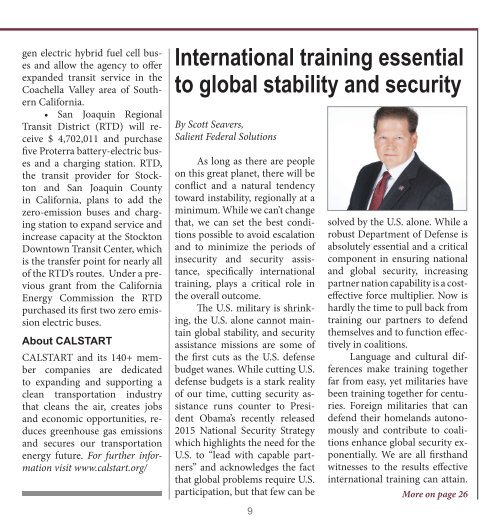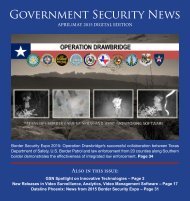Government Security News
Create successful ePaper yourself
Turn your PDF publications into a flip-book with our unique Google optimized e-Paper software.
gen electric hybrid fuel cell buses<br />
and allow the agency to offer<br />
expanded transit service in the<br />
Coachella Valley area of Southern<br />
California.<br />
• San Joaquin Regional<br />
Transit District (RTD) will receive<br />
$ 4,702,011 and purchase<br />
five Proterra battery-electric buses<br />
and a charging station. RTD,<br />
the transit provider for Stockton<br />
and San Joaquin County<br />
in California, plans to add the<br />
zero-emission buses and charging<br />
station to expand service and<br />
increase capacity at the Stockton<br />
Downtown Transit Center, which<br />
is the transfer point for nearly all<br />
of the RTD’s routes. Under a previous<br />
grant from the California<br />
Energy Commission the RTD<br />
purchased its first two zero emission<br />
electric buses.<br />
About CALSTART<br />
CALSTART and its 140+ member<br />
companies are dedicated<br />
to expanding and supporting a<br />
clean transportation industry<br />
that cleans the air, creates jobs<br />
and economic opportunities, reduces<br />
greenhouse gas emissions<br />
and secures our transportation<br />
energy future. For further information<br />
visit www.calstart.org/<br />
International training essential<br />
to global stability and security<br />
By Scott Seavers,<br />
Salient Federal Solutions<br />
As long as there are people<br />
on this great planet, there will be<br />
conflict and a natural tendency<br />
toward instability, regionally at a<br />
minimum. While we can’t change<br />
that, we can set the best conditions<br />
possible to avoid escalation<br />
and to minimize the periods of<br />
insecurity and security assistance,<br />
specifically international<br />
training, plays a critical role in<br />
the overall outcome.<br />
The U.S. military is shrinking,<br />
the U.S. alone cannot maintain<br />
global stability, and security<br />
assistance missions are some of<br />
the first cuts as the U.S. defense<br />
budget wanes. While cutting U.S.<br />
defense budgets is a stark reality<br />
of our time, cutting security assistance<br />
runs counter to President<br />
Obama’s recently released<br />
2015 National <strong>Security</strong> Strategy<br />
which highlights the need for the<br />
U.S. to “lead with capable partners”<br />
and acknowledges the fact<br />
that global problems require U.S.<br />
participation, but that few can be<br />
9<br />
solved by the U.S. alone. While a<br />
robust Department of Defense is<br />
absolutely essential and a critical<br />
component in ensuring national<br />
and global security, increasing<br />
partner nation capability is a costeffective<br />
force multiplier. Now is<br />
hardly the time to pull back from<br />
training our partners to defend<br />
themselves and to function effectively<br />
in coalitions.<br />
Language and cultural differences<br />
make training together<br />
far from easy, yet militaries have<br />
been training together for centuries.<br />
Foreign militaries that can<br />
defend their homelands autonomously<br />
and contribute to coalitions<br />
enhance global security exponentially.<br />
We are all firsthand<br />
witnesses to the results effective<br />
international training can attain.<br />
More on page 26







